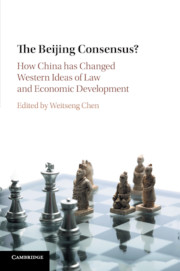Book contents
- Frontmatter
- Contents
- Figures
- Contributors
- Acknowledgments
- Introduction: Debating the Consensuses
- PART I Deconstructing the Beijing Consensus
- PART II Examining the Beijing Consensus in Context
- 4 The Legal Maladies of “Federalism, Chinese Style”
- 5 Lessons from Chinese Growth: Rethinking the Role of Property Rights in Development
- 6 Size Matters? Renminbi Internationalization and the Beijing Consensus
- 7 A Chinese Model for Tax Reforms in Developing Countries?
- 8 The Chinese Model for Securities Law
- PART III Revisiting the Beijing Consensus
- Bibliography
- Index
8 - The Chinese Model for Securities Law
from PART II - Examining the Beijing Consensus in Context
Published online by Cambridge University Press: 28 April 2017
- Frontmatter
- Contents
- Figures
- Contributors
- Acknowledgments
- Introduction: Debating the Consensuses
- PART I Deconstructing the Beijing Consensus
- PART II Examining the Beijing Consensus in Context
- 4 The Legal Maladies of “Federalism, Chinese Style”
- 5 Lessons from Chinese Growth: Rethinking the Role of Property Rights in Development
- 6 Size Matters? Renminbi Internationalization and the Beijing Consensus
- 7 A Chinese Model for Tax Reforms in Developing Countries?
- 8 The Chinese Model for Securities Law
- PART III Revisiting the Beijing Consensus
- Bibliography
- Index
Summary
Introduction
The Washington Consensus prescribes that financial reform and a liberal market are preconditions for economic development in developing countries. In stark contrast to this position is the development of the Chinese securities market. As opposed to liberalizing her securities market, China has subjected her securities market to extremely tight control. For over two decades since the opening of the national stock exchanges in the 1990s, the Chinese securities market has been heavily regulated by the China Securities Regulatory Commission (CSRC), and this is likely to be the case even in the future.
Where the development of securities markets is concerned, law and finance literature largely agrees with the ideas promulgated under the Washington Consensus. Still, some differences remain. While law and finance jurisprudence suggests certain links between the strength of securities markets and the protection of minority shareholders, it nevertheless argues that some amount of governmental intervention is necessary (and inevitable) before minority shareholders can be adequately protected. Governmental intervention takes the form of formulating securities disclosure rules, reviewing securities offering applications, and enforcing securities liabilities.
The role of the CSRC, however, is much more expansive and intrusive than what law and finance theorists propose. For example, while public offerings are subject to the CSRC approval just like in other countries, private offerings, which are exempted from approval or registration in many countries, are also subject to the CSRC approval or registration, depending on a number of factors such as whether an issuer is a listed or unlisted company. This has been the case for almost two decades since the promulgation of the PRC Securities Law (the “1998 Securities Law”) in 1998. Similarly, not only are offerings to investors within mainland China subject to the CSRC's approval, which is in line with international practice, offerings to investors outside of mainland China are also subject to the CSRC's approval under the existing laws.
The interventionist role of the CSRC in the Chinese securities market has not yet been adopted as a model for developing securities markets in other countries. There has not been any literature which discusses the Beijing Consensus in the context of the securities markets and their development. In fact, this chapter argues that the development of China's securities markets does not necessarily indicate that China's experience can be model for economic development, namely, the Beijing Consensus.
- Type
- Chapter
- Information
- The Beijing Consensus?How China Has Changed Western Ideas of Law and Economic Development, pp. 203 - 222Publisher: Cambridge University PressPrint publication year: 2017
- 1
- Cited by

